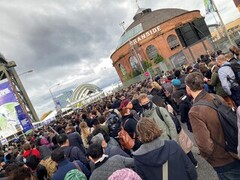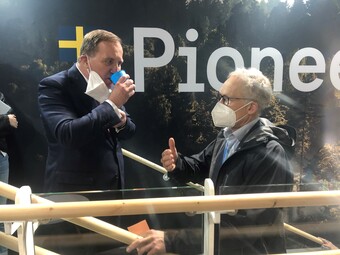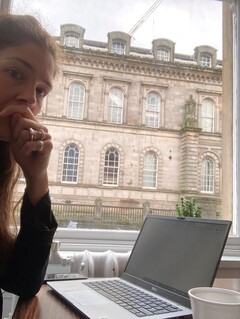Charlotte's take on COP26
Charlotte Flodin, our PHD student from Uppsala University, attended COP26 in Glasgow to get a glimpse on the latest policy discussions pertaining to greenhouse gas removal, especially in relation to agriculture. Here, we present a short take on her Climate Tour.

Last year, UK and Alok Sharma hosted COP26 in Glasgow. Delegates, politicians, lobbyists, researchers, students, activists, entrepreneurs and so many others from all over the world went to Scotland to take part. I arrived late Saturday night, after two days on trains with an abundance of face masks and hand sanitizer, anxious not to catch a cold and be forced to isolate myself. After successfully getting my hands on covid tests and my access card, I could enter the venue and take part in the Procedural Opening of Negotiations.
This was my first COP meeting ever, so I had to learn how to navigate the lively and crowded pavilions, how to schedule a thousand and one schedules, learn that access to the negotiations [1] got heavily restricted due to covid restrictions, accept that the rules constantly changed, learn where the best coffee places were located and how to deal with the constant fear of missing out. I guess I couldn’t have chosen a more intense or stressful COP, given the spread of covid-19, the high number of participants, but above all because of the burning need and pressure to tackle climate change.

My purpose in participating was to hear how greenhouse gas removal policy was discussed in relation to agriculture and whether greenhouse gases other than carbon dioxide were discussed in relation to capture. I had the opportunity to participate in a number of exciting seminars and lectures on agriculture and greenhouse gas removal. Among other things, I heard farmers' frustration over being portrayed as villains in the climate debate, and several of the farmers who participated emphasized that they should instead be seen as the climate workforce and that they should be let into the negotiation rooms. There were also discussions about the enormous potential of agriculture to contribute to greenhouse gas removal, but that the sector must be better financed in order to achieve ambitious goals. I also attended several talks on CCS and heard differing views on whether these approaches are silver bullets that should be implemented sooner rather than later, or if these technologies can be difficult to implement in an ethical and safe way. Advantages and disadvantages of carbon credits and markets were also discussed, as well as the risk of double counting and the need for transparent reporting.

One of the more exciting announcements that took place during the first week was when the methane pledge was launched. The methane pledge is an agreement to reduce methane emissions by 30% from 2020 levels by 2030. More than 100 countries have signed the agreement, which covers up to half of the anthropogenic methane emissions.
Unfortunately, I participated only the first week and was not around for the very dramatic end when the final wordings were debated and the Glasgow Climate Pact finalized. Luckily, much of it was filmed.
[1] Access to the negotiations was very limited. Fortunately, the more senior COP participants and RINGO representatives shared their notes. If you are interested in getting behind the scenes I would recommend you take a look at COP 26 Meeting Notes.
